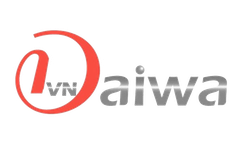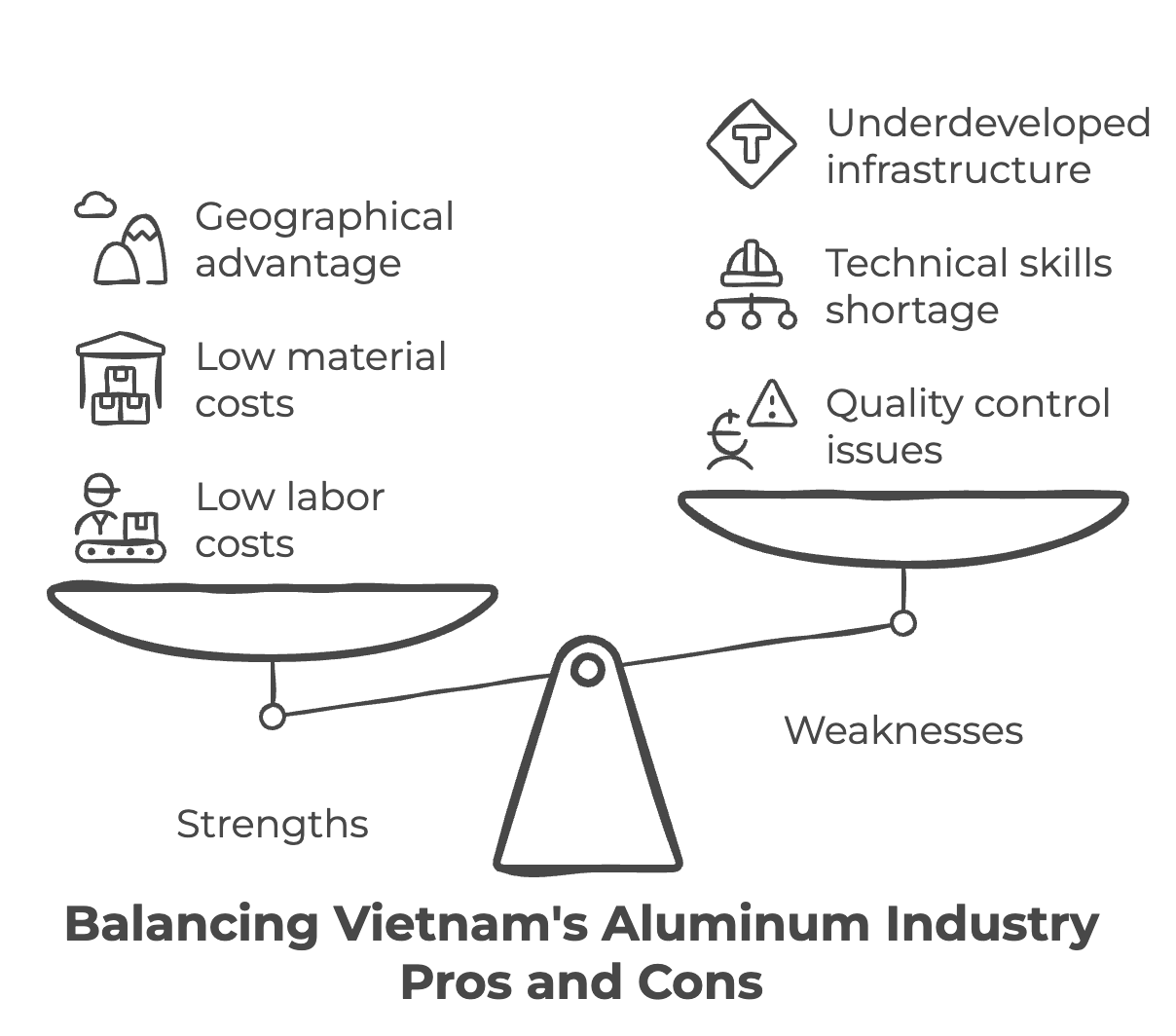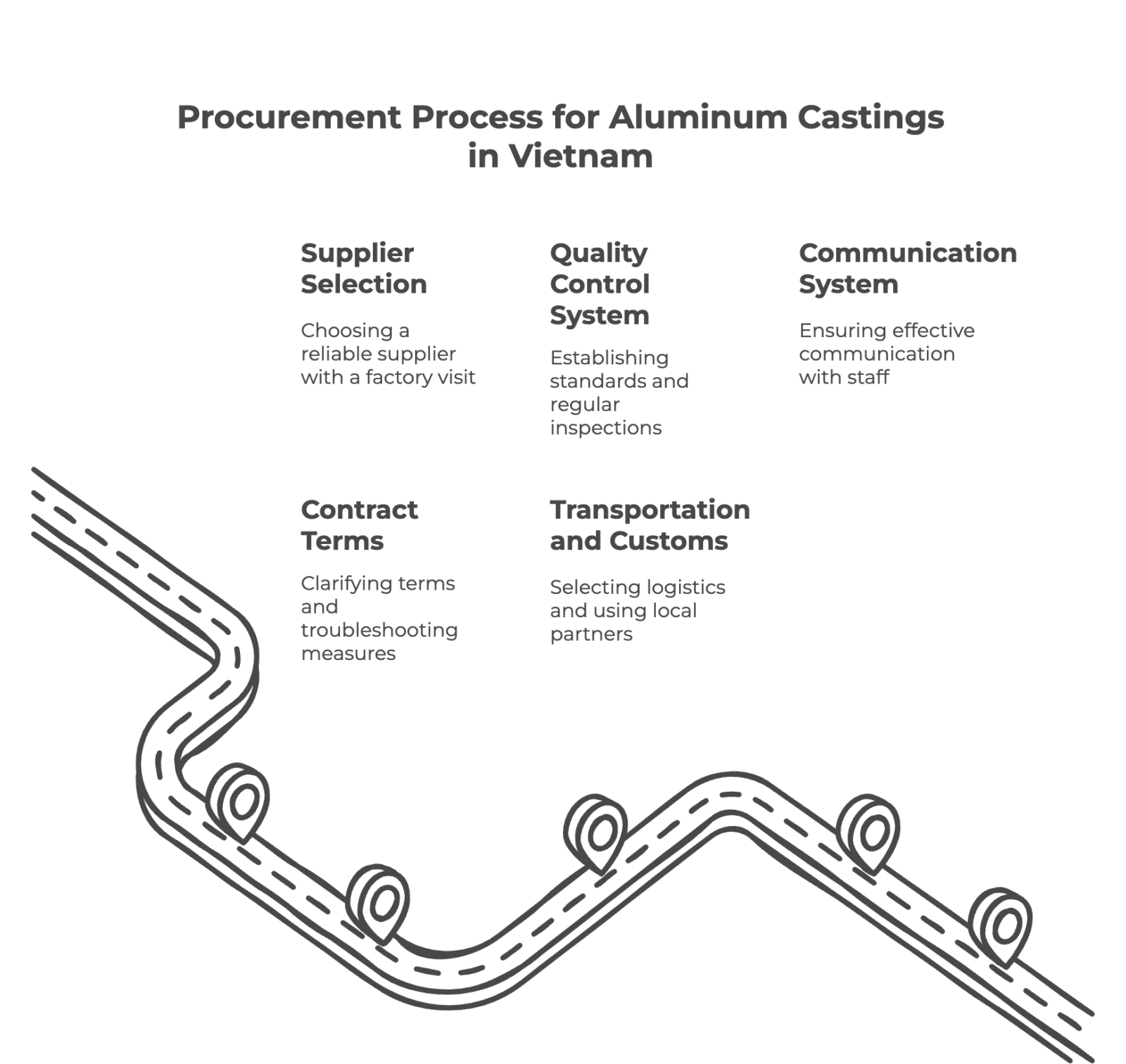◆Table of contents
ToggleIntroduction
Amidst accelerating globalization, the manufacturing industry faces the challenge of achieving both cost reduction and quality maintenance.
One area attracting attention in this context is procurement from Southeast Asian countries, particularly Vietnam.
Especially in the field of aluminum castings, Vietnam has become an attractive option for many Japanese companies due to its low labor and material costs, as well as its geographical advantages.
However, procuring aluminum castings in Vietnam also presents challenges that need to be overcome, such as quality control, communication, and differences in culture and customs.
In this article, we will explain the secrets to successfully procuring aluminum castings in Vietnam, including specific methods, points to note, and examples of successes and failures.
Current State of the Aluminum Casting Industry in Vietnam
Vietnam is attracting attention as a rapidly developing hub for the aluminum casting industry. In particular, industrial zones around Ho Chi Minh City and Hanoi are home to a growing number of aluminum casting manufacturers, both large and small. [1]
These companies utilize a variety of casting technologies, including sand casting and die casting, to produce products in a wide range of fields such as automotive parts, home appliances, and industrial machinery. In recent years, an increasing number of companies have introduced high-precision mold manufacturing and advanced quality management systems to meet customer needs. [2] In addition, the number of companies acquiring ISO certification, an international quality standard, is also increasing, indicating a growing awareness of quality. [3]
Strengths and Weaknesses of Vietnam
The aluminum casting industry in Vietnam has the following strengths and weaknesses:
Strengths:
- Low labor costs: Compared to developed countries, Vietnam has a significant advantage in terms of labor costs. This makes it possible to reduce manufacturing costs and increase price competitiveness.
- Low material costs: The cost of raw materials such as aluminum alloys is also relatively low, which further contributes to cost reduction.
- Geographical advantage: Located in the heart of Southeast Asia, Vietnam has excellent access to other Asian countries and is an ideal base for exporting products.
- Government support: The Vietnamese government is actively promoting the development of the manufacturing industry, including the aluminum casting industry, through tax incentives and other support measures.
- Growing market: The domestic market for aluminum castings is expanding due to economic growth and infrastructure development.
Weaknesses:
- Quality control: Although quality awareness is increasing, some companies still lack sufficient quality control systems. This can lead to defects and delays in delivery.
- Communication: Language barriers and cultural differences can sometimes hinder smooth communication with overseas customers.
- Technical skills: While the technical skills of Vietnamese engineers are improving, there is still a shortage of experienced personnel in some areas.
- Infrastructure: The infrastructure in some areas is still underdeveloped, which can affect logistics and transportation.
- Intellectual property protection: Concerns about intellectual property protection remain, especially for companies that are developing advanced technologies.
Despite these weaknesses, the Vietnamese aluminum casting industry has great potential for further growth. By addressing the challenges related to quality control, communication, and technical skills, Vietnam can become a leading player in the global aluminum casting market.
Reference
[1] https://www.jetro.go.jp/biznews/2023/03/e3c0a7808e0a339f.html
[2] https://www.vietnam-briefing.com/news/vietnam-manufacturing-an-overview.html/
[3] https://www.iso.org/obp/ui/#iso:std:iso:9001:ed-5:v1:en
[4] https://www.statista.com/statistics/1043198/vietnam-average-monthly-wage-by-economic-sector/
[5] https://www.japanvietnam.org.vn/ja/business/investment-environment/
[6] https://www.meti.go.jp/policy/trade_policy/fta_epa/vietnam_epa.html
[7] https://www.jica.go.jp/vietnam/office/information/press/2021/20211222.html
[8] https://www.worldbank.org/en/country/vietnam/overview
[9] https://www.vietrade.gov.vn/en/
[10] https://www.mofa.go.jp/mofaj/gaiko/oda/seisaku/fta_epa.html
Benefits of Procuring Aluminum Castings in Vietnam
The biggest advantage of procuring aluminum castings in Vietnam is its cost competitiveness. Labor and material costs are significantly lower compared to Japan, which can reduce product costs. In addition, the geographical advantage is also a major attraction. Access from Japan is good, and it is possible to reduce transportation costs and lead times. Furthermore, by utilizing FTAs (Free Trade Agreements), you can also enjoy benefits in terms of tariffs.
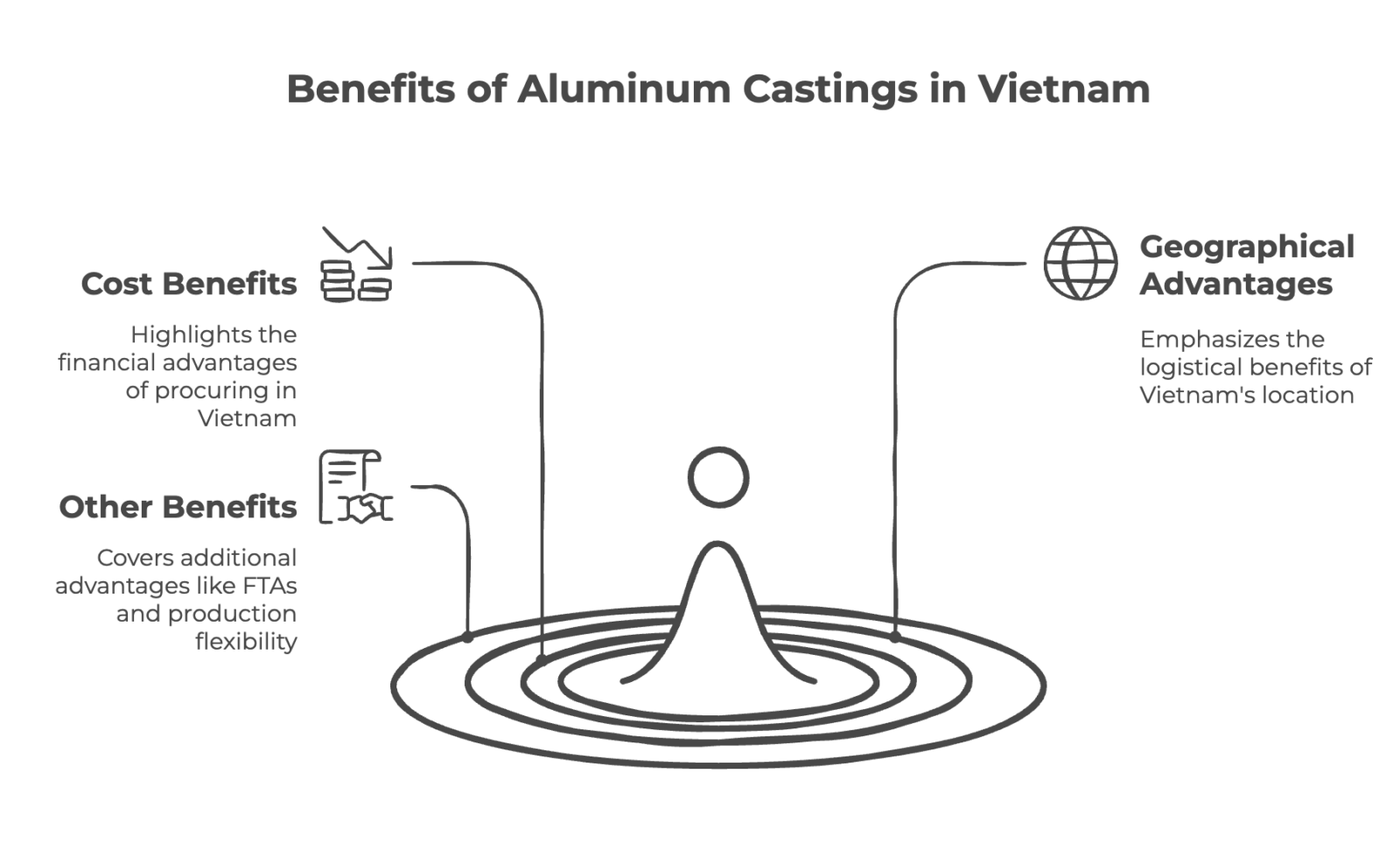
Cost Benefits
- Reduction of Labor Costs: The average wage in Vietnam is said to be about 1/10th of that in Japan [1], which can significantly reduce labor costs. Especially in the labor-intensive casting industry, this difference in labor costs is a significant cost advantage.
- Reduction of Material Costs: Aluminum can be procured domestically in Vietnam, which can reduce import costs. In addition, local procurement can also reduce exchange rate fluctuation risks.
Geographical Advantages
- Access from Japan: Vietnam is close to Japan, about 5 to 6 hours by plane [2], making it easy for business trips and local inspections.
- Transportation Costs and Lead Time: The transportation distance from Japan is short, which can reduce transportation costs. In addition, lead times may also be shortened.
- Logistics Network within the ASEAN Region: Vietnam is located within the ASEAN region, and has a well-developed logistics network with other ASEAN countries. This makes it an advantageous location for considering the construction of a supply chain throughout the ASEAN region.
Other Benefits
- Utilization of FTA: An economic partnership agreement (EPA) has been concluded between Japan and Vietnam [3], which reduces or eliminates tariffs on the import and export of aluminum casting products. This allows Japanese companies to procure aluminum castings from Vietnam at a lower cost.
- Flexible Production System: Aluminum casting manufacturers in Vietnam can often build flexible production systems that meet customer demands, from small lots to large lots.
Referenced
[1] JETRO: https://www.jetro.go.jp/world/asia/vn/invest_guide/04.html
[2] MOFA: https://www.mofa.go.jp/mofaj/kaiko/region/asean/index.html
[3] METI: https://www.meti.go.jp/policy/trade_policy/fta_epa/vietnam_epa.html
Disadvantages of Procuring Aluminum Castings in Vietnam
While procuring aluminum castings in Vietnam offers significant cost benefits, there are also some disadvantages to be aware of. We will explain the challenges that should be thoroughly understood in advance, such as quality control, communication, transportation, and country risk.
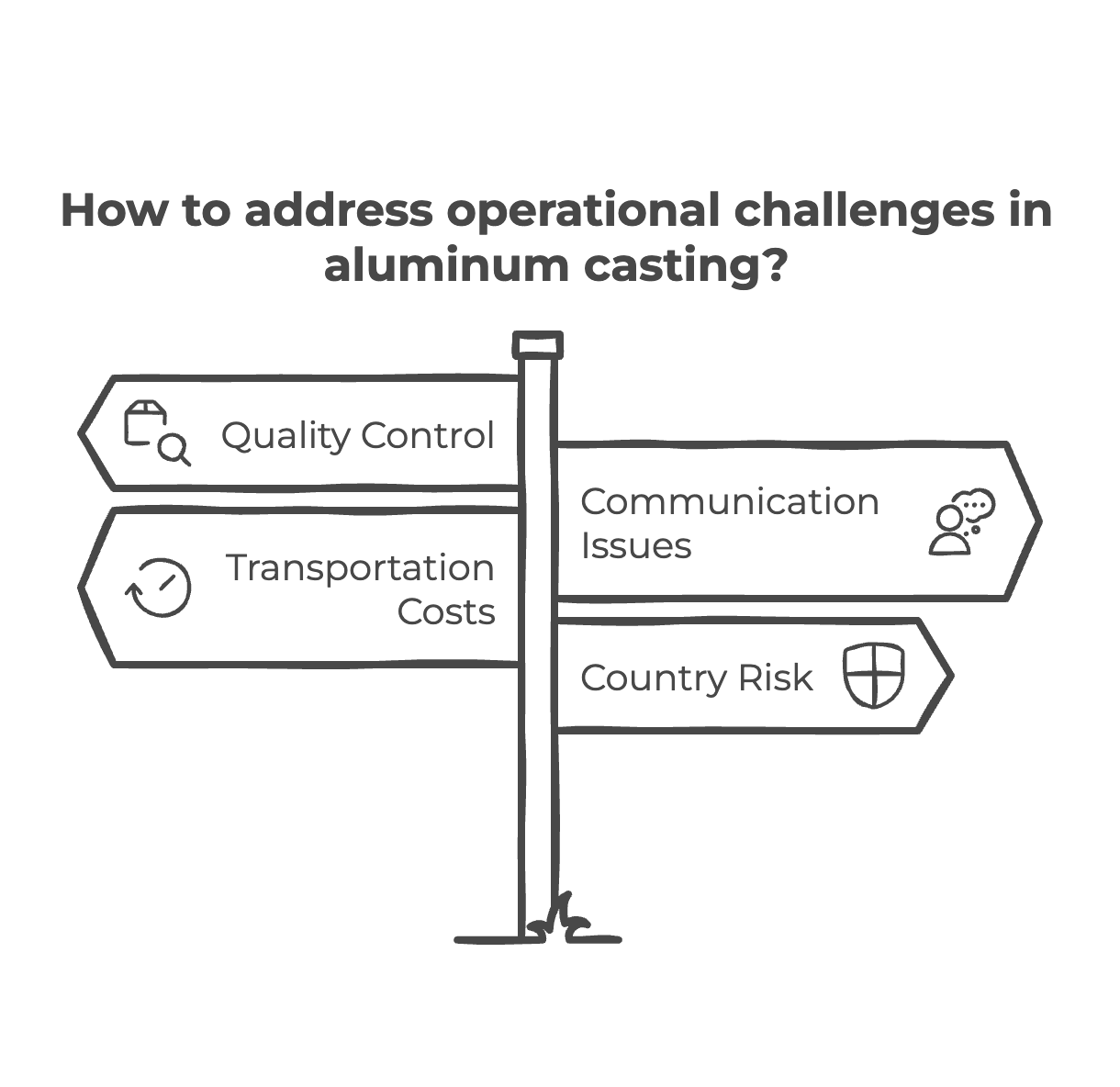
Quality Control Challenges
While the technical capabilities of aluminum casting manufacturers in Vietnam are improving, there may still be a gap compared to Japanese quality standards. [1] In particular, caution is needed as some small and medium-sized enterprises do not have advanced quality control and inspection systems in place. It is necessary to establish an appropriate quality control system by clearly communicating Japanese quality standards and conducting regular quality inspections.
Communication Issues
Differences in Vietnamese and Japanese languages, as well as cultural and customary differences, can hinder smooth communication. [2] Misunderstandings can occur in various situations, such as conveying specifications and requirements, and technical meetings. It is important to build a smooth communication system, such as securing interpreters or local staff who can handle Japanese, and utilizing web conferencing systems.
Transportation Costs and Lead Times
Transportation from Vietnam to Japan is mainly by sea. While sea transportation is less expensive than air transportation, it tends to have longer lead times. [3] It is also necessary to consider the risk of damage to products during transportation. It is important to make plans with sufficient lead time and to select appropriate packaging and transportation methods.
Country Risk
Vietnam is said to be a politically and economically stable country, but even so, country risk is not zero. [4] It is necessary to consider the possibility of unforeseen events such as changes in government, changes in legal systems, and deterioration of economic conditions. It is important to clarify the contract details and establish a risk management system.
Cautions When Procuring Aluminum Castings in Vietnam
In order to successfully procure aluminum castings in Vietnam, it is necessary to keep in mind several important points. Here, we will explain in detail the points to note at each stage, from supplier selection to quality control, communication, contracts, and transportation.
Supplier Selection
- Track Record and Reliability: Thoroughly research the supplier’s past performance and reputation, and choose a reliable partner. ISO certification status is also an important factor in the decision-making process.
- On-site Factory Visit: It is important to actually visit the local factory and see with your own eyes the production capacity, quality control system, equipment, etc. If possible, meet directly with the person in charge of the manufacturing site and assess their technical skills and communication skills.
Building a Quality Control System
- Clarification of Quality Standards: It is important to clearly communicate Japanese quality standards to the supplier and deepen mutual understanding. If necessary, explain specifically using drawings and samples.
- Implementation of Regular Inspections: In order to ensure product quality, it is essential to conduct regular quality inspections. Establish an appropriate inspection system, such as conducting inspections in-house or entrusting them to a third-party inspection organization.
- Dispatch of Engineers: It is also effective to dispatch engineers to Vietnam as needed to provide quality control and technical guidance.
Building a Communication System
- Japanese-speaking Staff: In order to minimize communication gaps, it is important to secure local staff who can speak Japanese.
- Use of Interpreters: Consider using professional interpreters when dealing with specialized technical terms or complex issues.
- Regular Information Sharing: In order to prevent misunderstandings and troubles, it is important to share information closely through regular meetings and reports.
Clarification of Contract Terms
- Price, Delivery Date, Quality Guarantee: Important conditions such as price, delivery date, and quality guarantee should be clearly stated in the contract.
- Troubleshooting Measures: It is important to decide on countermeasures in advance in case of any trouble.
Transportation and Customs Clearance Procedures
- Selection of Logistics Company: Select a reliable logistics company to minimize the risk of damage during transportation and ensure safe and timely delivery of products.
- Use of Local Partners: Using local partners who are familiar with customs clearance procedures in Vietnam will enable smooth import and export operations.
Key Points for Successfully Procuring Aluminum Castings in Vietnam
Procuring aluminum castings in Vietnam holds potential for cost reduction and expanding new business opportunities, but there are also points to be aware of and challenges to overcome in order to succeed.
Here are four important points to consider for successfully procuring aluminum castings in Vietnam:
1. Building Partnerships
To succeed in procuring aluminum castings in Vietnam, it is essential to build strong partnerships with reliable local suppliers.
When selecting a supplier, comprehensively evaluate not only the price but also the technical capabilities, quality control system, management status, communication skills, etc., and choose a company suitable as a long-term partner.
Even after selection, it is important to deepen mutual understanding and build a relationship of trust through regular visits and information exchange.
2. Technical Support
Although the aluminum casting industry in Vietnam has developed rapidly in recent years, there may be differences in technical capabilities and quality control levels compared to Japan.
In order to stably procure high-quality aluminum castings, it is important to actively provide Japanese technology and know-how to local suppliers and provide technical support.
Specifically, you can support the improvement of local suppliers’ technical capabilities by dispatching engineers, providing technical guidance, and supporting the introduction of quality management systems.
3. Developing Local Staff
Developing local staff is essential for success in business in Vietnam.
Especially in aluminum casting procurement, it is important to train local staff who play important roles, such as those in charge of quality control and communication.
You can improve the skills of local staff and achieve smooth procurement operations by implementing Japanese language education, technical training, and quality control training.
4. Continuous Improvement
Procuring aluminum castings in Vietnam is not the end once a contract is signed.
Since the market environment and the supplier’s situation are constantly changing, it is important to conduct regular evaluations and reviews, and continuously improve.
By accumulating improvements in all aspects such as the quality control system, communication system, and transportation system, you can achieve long-term stable procurement.
Case Studies of Aluminum Casting Procurement in Vietnam
Vietnam is attracting attention as a procurement destination for aluminum castings due to its low-cost labor force and well-developed manufacturing environment. In this section, we will learn about specific initiatives and lessons from both successful and unsuccessful cases, and explore the key points for successfully procuring aluminum castings in Vietnam.
Success Stories
- Company Efforts to Achieve Cost Reduction and Quality Improvement
Companies that have succeeded in procuring aluminum castings in Vietnam are making various efforts to achieve both cost reduction and quality improvement.
- Honda Vietnam: Achieved approximately 30% cost reduction in procuring aluminum die-cast products such as motorcycle parts. They have achieved a stable supply of high-quality products through technical support from the Japan headquarters, training of local staff, and building long-term partnerships with suppliers. [1][2][3]
- Daiwa Light Alloy Industry Vietnam: Manufactures high-pressure aluminum die-cast products such as automobile parts. They have achieved cost reduction in procurement through an integrated production system and quality improvement through the introduction of the latest die-casting machines. [4][5]
- VPIC Group: Manufactures precision aluminum die-cast parts for automobiles, electronic equipment, and industrial machinery. Their strengths are lightweighting and improved durability through the use of high-pressure die-casting technology, and a quality control system that meets the standards of customers in Japan and Europe and the United States. [6][3]
- ABC Vietnam Manufacturing: Manufactures high-pressure aluminum die-cast products such as electronic equipment parts and automobile parts. They have achieved cost reduction and quality improvement through an integrated production system, flexible design response based on customer specifications, and technical training for local staff. [7][8]
- Common Success Factors
The following common points can be seen in these success stories.
- Collaboration with Suppliers: By building long-term partnerships and supporting the improvement of local suppliers’ technical capabilities, they have achieved flexible responses to customer needs and optimization of quality and cost.
- Strengthening the Quality Control System: They ensure the uniformity and reliability of products by acquiring ISO certification, applying Japanese standards, and introducing 5S and Kaizen.
- Training of Local Staff: They are improving the skills of the local workforce through technical training and educational programs, leading to long-term cost reduction and quality improvement.
- Introduction of the Latest Technology: They are improving manufacturing efficiency by introducing the latest equipment such as high-pressure die-casting machines and CNC machining machines, as well as automation and 3D printing technology. [9][10]
Failure Stories
- Various Factors Leading to Project Interruption
There are various risks involved in procuring aluminum castings in Vietnam.
- A certain Japanese auto parts manufacturer: When procuring high-precision aluminum die-cast products for engine parts, the project was interrupted due to a combination of quality problems, lack of communication, and contractual problems. [11][12][13]
- A European home appliance manufacturer: When procuring aluminum castings for the housings of home appliances, they were forced to change their procurement destination due to defects in surface treatment, delays in delivery, and local infrastructure issues. [2][14]
- A certain Japanese SME: When procuring medium-sized aluminum cast parts for industrial machinery, they switched procurement to China due to problems with dimensional accuracy, lack of technical capabilities of the supplier, and poor contract management. [11][15]
- Lessons Learned from Failures
The following lessons can be learned from these failure stories.
- Thorough Quality Control: It is important to thoroughly verify prototypes and conduct quality audits in the initial stages, and to evaluate the supplier’s technical capabilities in advance to prevent casting defects.
- Strengthening Communication: It is important to deepen mutual understanding by accurately communicating technical specifications and quality standards, and by utilizing local staff and interpreters.
- Importance of Contract Management: It is important to clearly state quality standards, delivery dates, division of responsibilities, etc. in the contract, and to decide on countermeasures in advance in case of trouble.
- Confirmation of Local Infrastructure: It is important to understand the infrastructure situation of the entire supply chain and confirm whether the necessary equipment and technology are lacking.
To Succeed in Procuring Aluminum Castings in Vietnam
Procuring aluminum castings in Vietnam can achieve both cost reduction and quality improvement, but success requires consideration of a wide range of factors such as supplier selection, building a quality control system, strengthening communication, thorough contract management, and confirming local infrastructure.
Refer to successful and unsuccessful cases, minimize risks, and succeed in procuring aluminum castings in Vietnam.
Reference
[1] https://emidas-magazine.com/ja/news/market-trend-18-19-vol09-74
[2] https://emidas-magazine.com/ja/news/20112023-1285
[3] http://www.sohwa.jp/die-casting/
[4] https://daiwakk-vn.com/
[5] https://daiwakk-vn.com/en/
[6] https://www.vpic-group.com/aluminum-die-casting
[7] https://abc-vietnam.com/products/die-casting-aluminum/
[8] https://diecasting-vietnam.com/
[9] https://mobilityforesights.com/product/vietnam-aluminum-casting-market/
[10] https://vnoutsourcing.com/portfolio/die-casting/
[11] https://www.kanamorisangyo.co.jp/news/819
[12] https://jfs.or.jp/q_a/qa_kyoutsuu/
[13] https://marusank.jp/techinfo/%E9%8B%B3%E9%80%A0%E6%AC%A0%E9%99%A5%E3%81%AE%E7%A8%AE%E9%A1%9E%E3%81%A8%E5%8E%9F%E5%9B%A0
[14] https://sakaikinzoku.com/kaigaichoutatsusippai/
[15] https://www.tech-journey.jp/column/2024-6-7/
Summary
Procuring aluminum castings in Vietnam holds great potential for achieving both cost reduction and quality improvement. The key to success is collaboration with reliable suppliers, building a strict quality control system, and ensuring smooth communication.
Developing local staff and introducing the latest technology are also important factors for strengthening competitiveness.
However, there are also challenges to overcome, such as quality problems, lack of communication, contract troubles, and infrastructure issues.
By understanding the characteristics of the Vietnamese market and developing appropriate strategies, you can lead global procurement to success.
